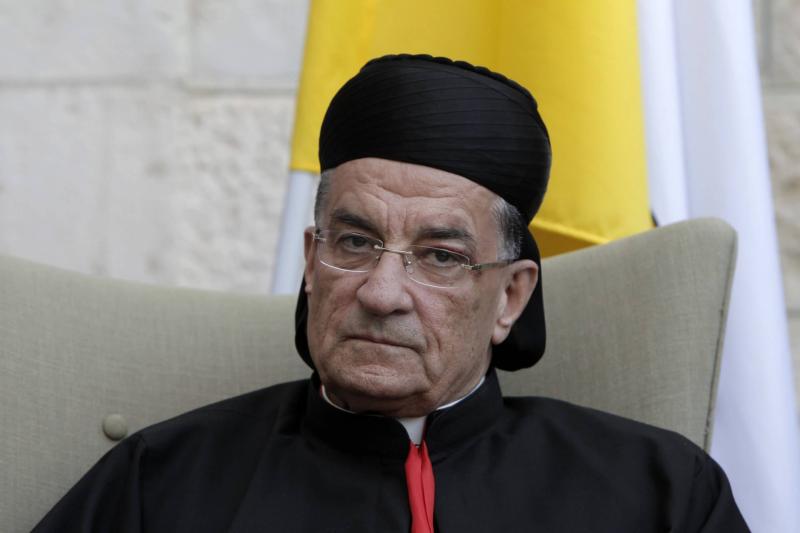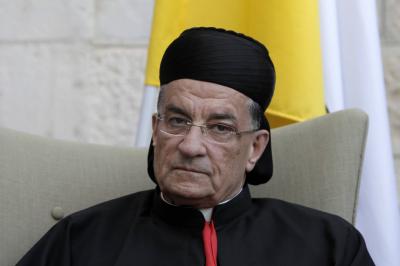Maronite Patriarch Bechara Al-Rahi viewed that "the boycott resulting from the lack of trust among Lebanese is the prevailing situation today, so no one dares to initiate a genuine and sincere national dialogue that transcends all personal and sectarian interests, nor does anyone see the utility in responding to a call for dialogue that does not seriously delve into the core of the contentious issues that have accumulated and turned into ticking bombs." He asked: "Is it not time to be true statesmen who consider nothing but a free, prosperous, and sovereign Lebanon, a message and model for both East and West, and to immediately proceed with electing a president of the republic who leads a sincere national dialogue for Lebanon that restores trust and places us on the right track to solidify stability and rebuild on all fronts, most notably political, financial, economic, judicial, and security?"
He stated during the conference "Renewal for the Homeland" titled "From Lebanon the Battleground... to Lebanon the Homeland," from the Beirut waterfront: "The influences and external interests in 1975 exploited the contradictions within the Lebanese arena, turning Lebanon into a battleground for chaos and settling scores and pushing some factions to expand their dreams and ambitions, wagering on external forces and illusory victories which soon turned out to be a plunge into the unknown, if not outright suicide, transforming Lebanon into an open arena for all destructive possibilities."
He added: "After the end of that cursed war, cohesion returned to the Lebanese fabric and the project of state and institution-building re-emerged with a genuine desire evident from most Lebanese factions, but this project faced many difficulties and challenges, with those negatively impacted by the establishment of the state on the lookout, whether from abroad or within."
He continued: "Closed 'cantons' emerged in the Lebanese circles that practice their private and public lives detached from the expansive Lebanese society. They are 'social cantons' that deliberate on how to politicize themselves and grant themselves a legitimate status. However, there is a vast difference between the clubs' closed cantons and the constitutional cantons. Lebanon has become a class-based country without class struggle. Its social groups have formed self-contained classes that practice a private lifestyle without social, security, or even political conflicts. When the people revolted and protested and blocked roads for better daily living conditions, they revolted against no one, and against incorrect titles. When they chose their representatives in elections, they often chose incorrect names as well. If these thoughts cross some minds, it is because Lebanon was -- with all its flaws -- a country of renaissance and has become a country of decadence, a country of abundance has now turned into a country of misery, a country of freedom has now become a country of chaos."
He said: "Recently, there have been various constitutional proposals to find constitutional formulas that would restore hope to life in Lebanon without undermining its entity. These factions believe they have been patient enough with the existing formula and have given it all its chances, while other factions, from all sects as well, believe that the difficult stages are behind us and that the current formula will regain its brilliance and therefore there is no need to search for new formulas. But these do not realize that the brilliance of the Lebanese formula cannot persist independent of the political, security, and identity stability in all Middle Eastern countries. The development of Lebanese society has been discordant. Factions that were distant from the Lebanese idea have come to defend it, while others that were close have distanced themselves. They have ignored it and remained ignorant of it, joining other ideas that have nothing to do with the Lebanese concept, making reconciliation between them impossible."
He added: "The solutions proposed by the Lebanese for the new Lebanon are met with skepticism regarding their success because Lebanese society has become resistant to solutions and accustomed to problems, and because they propose them under the pressure of events. The Lebanese have become accustomed to moving from one crisis to another as if crises are easier than solutions. National solutions are complex, and factional solutions are not a subject of consensus. The major issue in Lebanese society is that the foundational elements that constitute a 'nation' – which are the people, history, geography, language, civilization, and/or culture – are the divisive elements that separate the Lebanese. Some Lebanese parties, influenced by their surroundings, have reduced all foundational elements of the nation to religion, and then to sect, thereby eradicating the concept of a Lebanese civilizational nation and swept away the concept of state/identity in their path. There is no value for any nation or state unless it provides its people with sustainable peace, freedom, and dignity. These virtues are the fruit of the will for shared life before being the outcome of the constitution and the law."
He continued: "The fabric of Lebanese society has changed civilizationally and regionally. Lebanon is no longer the fabric it was before 1975, nor the fabric of the two-year war, nor the fabric of the cantons of the eighties, nor the fabric of the mixing of the nineties of the last century. From here, the process of electing a president is complicated because political forces believe that the upcoming president will be the architect of reshaping the new Lebanon, and therefore must impose prior conditions on him. Some want a president who will complete a project, while others want a president who will overturn it. But in truth, we want a president who will change and create a new, clean national environment, an ethical behavior, a commitment to historical constants, and positive relations with the world, and to put an end to dependency and the disintegration of legitimacy, a new approach to problems, and to set the Lebanese free."
He stated: "The fixed and effective idea of Patriarch Elias Peter Hawi was to create Greater Lebanon, reclaiming areas that were separated from it by the Ottoman mandate, disregarding its demographic structure, as he believed that belonging to Lebanon was based on citizenship and not on religion. Thus, he separated religion from politics in Lebanon to this day. With Patriarch Antonios Peter Arida, from the declaration of the State of Greater Lebanon to the station of independence, the patriarchate’s stance remained steadfast on the choice of Lebanon as a homeland in the concept of a capable and just state. With Patriarch Paul Peter Meouchi, the patriarchate continued its steadfastness on the choice of the state-homeland. Moreover, the patriarch rejected the Cairo Agreement in 1969 and sided with the project of the state. With Patriarch Antonios Peter Khreish, the patriarchal voice continued to reject all Christian and Islamic proposals while war was breaking out, siding with the homeland-state project. With Patriarch Nasrallah Peter Sfeir, the preference for Lebanon the homeland over Lebanon the battleground persisted. With us, the choice of Lebanon as the homeland-state continues."
He concluded: "We have only one choice before us, which is the state-homeland that we must work for and commit to, for the sake of its shining face through the first century of its formation."




